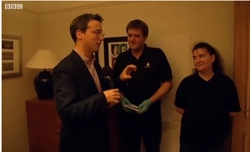Bedbugs made BBC breakfast news this morning with an interview with bedbug experts David Cain and Sparks Johnstone broadcast at 06.20 and then again at 07.20 and 08.20. The associated online news story made the number 1 most watched spot throughout the morning.
The BBC”s Richard Westcott reported from a hotel in south London. He outlinedthe resurgence in bedbug infestations that pest controllers are already sofamiliar with quoting the closure of Nike Town on the exclusive fifth avenuedues to an infestation and the fact that bedbugs has even got into the basementof the Empire State Building.
|
David Cain outlined how important it is to look for evidence of bedbugs as somepeople do not react to the bites. He warned the public that it was mostimportant to check places where they stayed away from home to avoid picking themup in the first place. “The reality is that people aren’t detecting the problem early enough andtherefore professional assistance with experienced people is necessary to solvethe problem,” he said. We suspect that one of the reasons that this item made the most watched spot was the BBC news headline which was ‘I sleep with bedbugs for a living’. |
|
|
This is where Sparks Johnstone came in. Part of her job is to sleep in a bed and be bitten by bedbugs. Basically after chemical treatment has taken place she can be employed to sleep in the bed and make sure the bedbugs come out and don’t just hibernate away until the residual insecticide has worn off susceptible.”
What an interesting idea – getting paid for sleeping – we’ve always said thepest control business was creative.
To see the full broadcast click here.
Tuesday’s Daily Mail also picked up on the bedbug theme looking at how bedbugsare hitching a ride around the world on public transport. There werecontributions from Bed Bug Limited’s David Cain and Rentokil’s technicaldirector Savvas Othan.
Savvas explained; “The short turnaround times for planes and other forms oftransport means they are sometimes not inspected as thoroughly as they used tobe.”
David said: “The number one reason for the spread of bedbugs is the lack ofpublic awareness. People simply do not know how to detect them in the way theywould have done in the 1950s and 1960s. They are a problem on buses, trains andsubway systems, and on cruise ships too – any form of transport where there is ahigh turnover, really.”
To read the full article click here.


